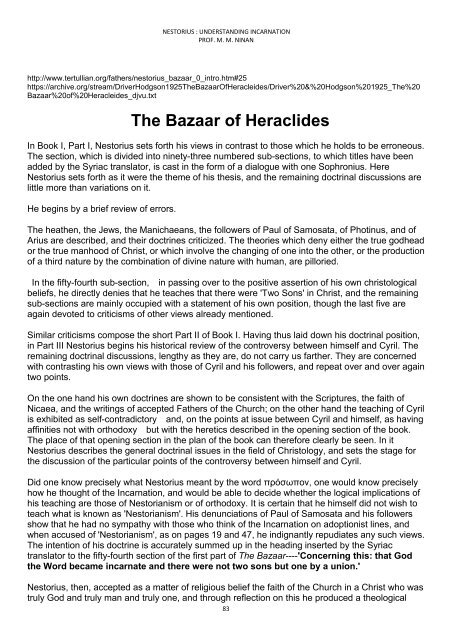Nestorius
Create successful ePaper yourself
Turn your PDF publications into a flip-book with our unique Google optimized e-Paper software.
NESTORIUS : UNDERSTANDING INCARNATION<br />
PROF. M. M. NINAN<br />
http://www.tertullian.org/fathers/nestorius_bazaar_0_intro.htm#25<br />
https://archive.org/stream/DriverHodgson1925TheBazaarOfHeracleides/Driver%20&%20Hodgson%201925_The%20<br />
Bazaar%20of%20Heracleides_djvu.txt<br />
The Bazaar of Heraclides<br />
In Book I, Part I, <strong>Nestorius</strong> sets forth his views in contrast to those which he holds to be erroneous.<br />
The section, which is divided into ninety-three numbered sub-sections, to which titles have been<br />
added by the Syriac translator, is cast in the form of a dialogue with one Sophronius. Here<br />
<strong>Nestorius</strong> sets forth as it were the theme of his thesis, and the remaining doctrinal discussions are<br />
little more than variations on it.<br />
He begins by a brief review of errors.<br />
The heathen, the Jews, the Manichaeans, the followers of Paul of Samosata, of Photinus, and of<br />
Arius are described, and their doctrines criticized. The theories which deny either the true godhead<br />
or the true manhood of Christ, or which involve the changing of one into the other, or the production<br />
of a third nature by the combination of divine nature with human, are pilloried.<br />
In the fifty-fourth sub-section, in passing over to the positive assertion of his own christological<br />
beliefs, he directly denies that he teaches that there were 'Two Sons' in Christ, and the remaining<br />
sub-sections are mainly occupied with a statement of his own position, though the last five are<br />
again devoted to criticisms of other views already mentioned.<br />
Similar criticisms compose the short Part II of Book I. Having thus laid down his doctrinal position,<br />
in Part III <strong>Nestorius</strong> begins his historical review of the controversy between himself and Cyril. The<br />
remaining doctrinal discussions, lengthy as they are, do not carry us farther. They are concerned<br />
with contrasting his own views with those of Cyril and his followers, and repeat over and over again<br />
two points.<br />
On the one hand his own doctrines are shown to be consistent with the Scriptures, the faith of<br />
Nicaea, and the writings of accepted Fathers of the Church; on the other hand the teaching of Cyril<br />
is exhibited as self-contradictory and, on the points at issue between Cyril and himself, as having<br />
affinities not with orthodoxy but with the heretics described in the opening section of the book.<br />
The place of that opening section in the plan of the book can therefore clearly be seen. In it<br />
<strong>Nestorius</strong> describes the general doctrinal issues in the field of Christology, and sets the stage for<br />
the discussion of the particular points of the controversy between himself and Cyril.<br />
Did one know precisely what <strong>Nestorius</strong> meant by the word πρόσωπον, one would know precisely<br />
how he thought of the Incarnation, and would be able to decide whether the logical implications of<br />
his teaching are those of Nestorianism or of orthodoxy. It is certain that he himself did not wish to<br />
teach what is known as 'Nestorianism'. His denunciations of Paul of Samosata and his followers<br />
show that he had no sympathy with those who think of the Incarnation on adoptionist lines, and<br />
when accused of 'Nestorianism', as on pages 19 and 47, he indignantly repudiates any such views.<br />
The intention of his doctrine is accurately summed up in the heading inserted by the Syriac<br />
translator to the fifty-fourth section of the first part of The Bazaar----'Concerning this: that God<br />
the Word became incarnate and there were not two sons but one by a union.'<br />
<strong>Nestorius</strong>, then, accepted as a matter of religious belief the faith of the Church in a Christ who was<br />
truly God and truly man and truly one, and through reflection on this he produced a theological<br />
83

















